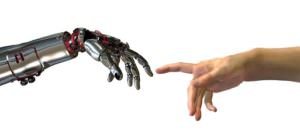Robotic surgery: between God and the robot
" If you have created a machine with a conscience, it is no longer the history of man. It is the history of the gods . " (From the film" Ex Machina ")
Performing all the "neuronic discharges" of one's own imagination, falling victim to an invasionistic hypothesis of an independent robotic civilization, is the concern of many who clash for the first time with the term "Artificial Intelligence".

Inference that certainly interfaces with the projection on the screens of our deepest fears: a humanoid species that disintegrates humanity. This is the scenario that for many years has been represented in many films and, in which, in these years, a reference model has been built .
It all started with Leonardo da Vinci , but also with the will of man to want to be God , and I do not mean in terms of omnipotence or divine power, but as the holder of the "two" faculty: the ability to create a subject, to design it and program it in every genetic fiber transferring a part of itself, its own heritage, its own resources ("in-formations").
From this perspective a parallelism seems to emerge: "God created man in his image and likeness, and man created in his image and likeness the robot"; on the one hand the mud of the earth and the breath of life, on the other hand microchips and transistors .
Two religions
The Biblical narrative reveals to us that God first created man, and then woman. When we talk about Robot in the collective imagination, the attribution to gender is in reference to the masculine.
In the Old Testament man is identified as a servant of Yahweh ; Robot comes from a Slavic word, rabota, which means help , servitude .
It is the man who is under God and above the Robot. He is the man who follows God's law and places laws on the robot.
The laws of I. Asimov represent, until today, the commandments of humanoid robotics.
The Bible speaks of the end of the world; the same catastrophic prediction is associated with the future of artificial intelligence.
Faced with this perspective, Tibor Vamos's statement loses its meaning "We do not possess the point of view of God". This gradation of reality, thanks to artificial intelligence, is overcome.
He is the man who from creation, becomes creator.
The metaphors mentioned in this article do not have the purpose of mixing a series of historical coincidences in a melting pot to make a superior synthesis come out (man and God are the same thing); not, therefore, a subjugation of hypothetical imperatives ("I want to have a nice home"; "I want to be rich"; "I want to be God") but to understand an interesting point of view in evolutionary terms, that is the level of evolution placed on a plane reference: the tools produced by man are the projection of the capacities of his brain .
JS Bruner defines his position as "evolutionary instrumentalism" because he believes that man is able to use his own intelligence to create and use tools and tools or technical expedients that make him able to express and expand his faculties .
We must ask ourselves at this point if cinema and science have a common thread: reality, and their difference lies only in the different times of realization.
Will the Robots destroy humanity by starting from jobs?
Personally, when we talk about this issue, I refer to the words of J. Monod «... one of the fundamental properties characteristic of all living beings is to be objects endowed with a project ... All the functional adaptations of living beings ... realize particular projects that they can be considered as aspects or fragments of a single primitive project, that is the conservation of the species ... ».
And if the robots, one day, were provided with a conscience and, therefore, the ability to decide the fate of the entire human species?